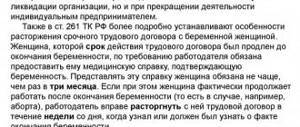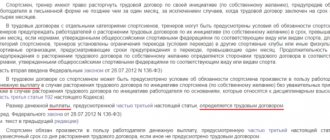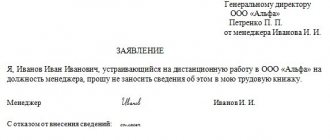The state guards the interests and rights of the expectant mother. From the moment the woman informs the employer of her situation, her dismissal will be illegal, regardless of the reason. But is it possible to fire a pregnant woman under a fixed-term employment contract? What to do if a woman is hired under the specified conditions, the contract term has come to an end, and the employee has not yet given birth? What are the consequences for an employer of dismissing a pregnant woman under a fixed-term employment contract?
Features of a fixed-term employment contract
Sometimes an employer hires an employee to perform professional duties for a short time.
Since in order to comply with the law it is necessary to conclude an employment agreement with the employee, a fixed-term contract will be the optimal solution in such a situation. It also occurs in other cases, for example, when an employee is hired to replace another who, by law, retains his job. It is also relevant to conclude such a contract for seasonal work.
The very name “fixed-term” indicates that such an employment contract has a certain period. Moreover, the maximum period of validity of such an agreement cannot exceed 5 years, and the minimum period is not specified by law.
The document must contain the same basic details as an open-ended employment agreement between the employee and the employer. But in addition to them, you should not forget to indicate the exact duration of its action.
Employees hired under a fixed-term employment agreement have slightly different rights than those working under an open-ended contract:
- There is no probationary period for them.
- If the contract period is less than 2 months, then the employee, subject to his written consent, may be required to work on weekends and holidays. But this work will only be compensated in monetary terms in double the amount. Additional days off are not provided.
- If the contract term is up to 2 months, the dismissed employee is not entitled to severance pay.
- If such an employee decides to quit, he is obliged to notify the employer about this no later than 3 days before the expected date of termination of the employment relationship.
But what if the work was performed under a fixed-term employment contract, and pregnancy occurred during this period of time? In most cases, the employer will not be able to terminate the contract until the employee’s “interesting situation” ends. But there are some cases when the dismissal of a pregnant woman under a fixed-term employment contract will be considered legal.
This is also important to know:
Compensation for unused vacation without dismissal: when provided, procedure for registration
What information is contained in the certificate?
To extend a fixed-term employment contract during pregnancy, the employee must obtain the appropriate certificate from the antenatal clinic where she is registered. This document indicates that the woman is indeed expecting a child, and even the pregnancy period is prescribed. There are no requirements for this document, so it is drawn up by medical workers in any form. It should be taken immediately after the doctor confirms that the woman is expecting a child.
You must bring such a certificate throughout the entire period of waiting for the baby. Therefore, it is required to request a document once every three months.
End of a fixed-term employment contract during pregnancy
If a woman was not hired to replace another employee, then provided she provides a medical certificate of pregnancy and an application to extend the employment agreement, her dismissal will be illegal, even if the contract has expired. The employer will be able to return to this issue only after the birth of the baby or the end of pregnancy for other reasons.
In order to continue working, you must submit an application addressed to the head of the enterprise with a request to extend the employment agreement and attach a medical certificate of pregnancy to it. If such actions are not taken, then the employer may well try to terminate the employment contract. But if the employee appeals to the judicial authorities, most likely the court will side with her.
The employer retains the right to control the situation by requiring the woman to provide a certificate every 3 months. If he does not do this or requests the document more often, then the woman is not obliged to satisfy his requests and bring the certificate again on her own initiative.
Renewal Features
Such supporting documents are certificates issued by a medical institution.
They are issued at the antenatal clinic of the medical institution in which the employee is registered.
To obtain a contract extension, it is not enough to have the appropriate certificate in hand. The woman must notify the employer and document her request to extend the employment relationship by writing a separate statement.
Having received such an application, the manager can extend the validity of the document until the birth of the child or until the end of the leave granted in connection with the upcoming birth. But he has the legal right to part with the employee from the moment the child is born.
Tragic events that led to the death of the baby (for example, intrauterine death or miscarriage) can also serve as a basis. In this case, the reason for termination of the employment relationship is a change in the status of the employee - she becomes a member of the general public.
Therefore, according to labor legislation, the employer has the right to require documentary evidence of a normal pregnancy. In this case, the employee will not be able to keep her employer in the dark.
Termination of the contract occurs within seven days from the date of receipt of information about the birth of a baby or termination of pregnancy.
The employer's actions in such cases are completely legal.
In addition to extending the validity period of the document, the employee has the legal opportunity to demand maternity leave and parental leave. These requirements must be reflected in the specified application. This right of a woman is directly indicated by Article 261 in its second part.
The received application from the employee serves as the basis for extending the employment relationship. Changes to the current contract are made by drawing up an additional agreement, which is attached to the main document and the employee’s personal file.
General rule when an employment contract with a pregnant employee expires
The general rule in these circumstances is this: a temporary employment contract must be extended until the end of the pregnancy, and if the employee takes maternity leave, until its end (Part 2 of Article 261 of the Labor Code of the Russian Federation).
The following conditions apply:
- a woman must confirm her pregnancy with a medical certificate;
- the woman must submit a written application to extend the contract;
- if the contract period was extended until the end of pregnancy, the woman must, at the request of the employer (we recommend making it in writing), reconfirm the fact of pregnancy every three months;
- the employer has only a week from the day he learned (should have known) about the end of the pregnancy to dismiss the employee (if she actually continues to work after the end of the pregnancy);
- If a woman goes on maternity leave after giving birth, dismissal will be possible on the day the leave ends.
Taking into account the fact that the term of an employment contract is one of its mandatory elements (paragraph 4, part 2, article 57 of the Labor Code of the Russian Federation), it is recommended to sign an additional agreement to the contract (Article 72 of the Labor Code of the Russian Federation), fixing new conditions in it.
The fact of renewal of the contract should be recorded by order.
There is one exception to the rule on extending an employment contract.
Rules for registration of maternity leave
Maternity leave should be provided even if there is only a temporary agreement drawn up between the manager and the specialist. For its design, the following rules are taken into account:
- in the application, the woman must indicate that she expects to have maternity leave;
- it begins at 30 weeks of pregnancy;
- in the document it is advisable to refer to the provisions of Art. 261 TK.
Under such conditions, the employer cannot refuse the employee’s request. If he insists on not taking leave or renewing the contract, then it is advisable to file a complaint with the labor inspectorate.
If a woman goes on maternity leave under a fixed-term employment contract
Working under a fixed-term employment contract and pregnancy imply the provision of paid maternity leave. The employer is obliged to provide it to the woman upon written request on the basis of a certificate of incapacity for work. Its duration is established by law for certain cases.
This is also important to know:
The employer does not sign the resignation letter: what should the employee do?
Regardless of the conditions under which the woman was registered (under a fixed-term or open-ended contract), she has the right to receive benefits for the entire period of vacation. Like everyone else, an employee hired under a fixed-term agreement goes on maternity leave within the statutory period (28 or 30 weeks).
Payments
On the day of dismissal, the manager must pay his employee in full, if the full payment was not made before the start of the maternity leave. She is entitled to additional payments:
- salary for the number of hours worked;
- compensation for vacation days that were not used;
- maternity benefit, which must be calculated within 10 days . It is issued upon receipt of wages.
A woman must receive all of the above payments regardless of the type of employment contract.
Important! If the employer violates the described norms, the woman has the right to go to court. To do this, you must provide copies and originals of all medical certificates confirming her position, notice of termination of the contract and order. Usually the court takes the employee’s side and she is reinstated in her previous position.
If a woman replaces an absent employee
However, there are some nuances in which a fixed-term employment contract, dismissal and pregnancy are not mutually exclusive concepts. This applies to cases where the expectant mother replaces a temporarily absent employee who can begin to perform his professional duties at any time.
Free legal consultation We will answer your question in 5 minutes!
Ask a Question
Free legal consultation
We will answer your question in 5 minutes!
Ask a Question
This means that every day of work of the pregnant woman replacing him may be the last. In this case, according to the law, she should be transferred to another vacant position until the end of the pregnancy. Moreover, this job may pay less or require less qualifications.
If there are no vacancies or the employee refuses them, then, in accordance with the law, her dismissal will be legal.
Dismissal when the replaced employee returns to work
This point is also regulated by Article 261. If, during the pregnancy of an employee, the specialist in whose place she was hired returns to work, dismissal is possible, but subject to certain conditions.
The expectant mother is obliged to return the position to the returning employee. The management provides the pregnant woman with information about all possible vacancies that correspond to her position and qualifications. If a woman has given her written consent, she can be transferred to a position with a different salary and qualifications. The location must be appropriate for the health condition.
Additionally
Part-time work and lower wages are acceptable.
Management may raise the issue of terminating the employment relationship if the following facts occur:
- Birth of a child;
- Termination of pregnancy for other reasons.
Attention
The company administration has the right to demand confirmation of her condition from the pregnant woman once per quarter.
In what cases can a pregnant woman be fired?
Work under a fixed-term employment contract, even if pregnancy is documented, can still be terminated. There is a main legal reason for this - the initiative to terminate the employment agreement coming from the pregnant woman herself.
It is also permitted to dismiss a female employee replacing an employee if he returns, provided that the employer has no vacancies or the pregnant woman refuses to move to another job.
Dismissal of a pregnant woman is also permissible in the event of liquidation or reorganization of an enterprise.
Prohibition on dismissal of a pregnant woman
Most female employees believe that the boss will not be able to terminate a fixed-term employment contract with a pregnant woman. According to Russian law, it is prohibited to dismiss such employees at the request of management.
Reference! An exception to this rule is specified in Part 1 of Article 261 of the Labor Code of the Russian Federation - the liquidation of an organization or individual entrepreneur is a reason for the dismissal of even a pregnant employee.
If the temporary agreement has expired, current legislation does not consider this as termination of a fixed-term employment contract with a pregnant woman. Therefore, the company’s management on this basis may simply not renew it, thereby “saying goodbye” to the employee.
Deadlines
If an employee hired under a fixed-term employment agreement becomes pregnant, she can be dismissed only after her pregnancy ends for reasons not related to the birth of the baby, or after the birth of the child and the completion of maternity leave.
Leave is granted on the basis of a sick leave certificate and the woman’s application. Three days before the period of maternity leave comes to an end in accordance with the sick leave provided, the employer is obliged to notify the employee of the upcoming termination of the employment contract.
Considering that it will most likely be inconvenient for the mother and baby to come to review this notice, you can inform her about the end date of maternity leave and the date of dismissal on the day she provides the sick leave and application.
If the pregnancy did not end with the birth of a child, but was interrupted for other reasons, dismissal will be legal within a week after the employer has established this fact. Moreover, this can only be done by requesting a certificate from the woman, provided that the previous one was provided more than 3 months ago.
This is also important to know:
How to formalize the dismissal of an employee by way of transfer to another position or to another organization
Otherwise, when the employer has doubts about the employee’s pregnancy, he can request an answer from her without requiring a certificate. She may not respond to the request, but this will serve as an excuse for the employer in the event of legal disputes.
Renewal terms
The extension period depends on the request stated:
- If an employee requests only maternity leave, the employment relationship with her is terminated upon the birth of the baby or in the event of a miscarriage (abortion). The extension is carried out for a period of 140 to 194 days, depending on the characteristics of childbirth and pregnancy (without complications, with complications or multiple births).
- If the employee also requests a period of maternity leave, the contract with her can only be terminated at the end of this period. Usually this is a period of up to three years from the birth of the baby.
- Also, the extension of labor relations occurs when working in a zone of man-made disasters or the premature birth of a child. And their termination is formalized taking into account the reasons reflected in the Labor Code (childbirth, miscarriage, end of vacation).
The nuances of dismissing a pregnant woman under a fixed-term employment contract
Working under a fixed-term employment contract and pregnancy are common reasons for going to court. It should be borne in mind that the law protects the interests of the expectant mother. Dismissal of a pregnant woman under a fixed-term employment contract is possible only in a few cases and must be formalized in accordance with the law.
Firstly, it is necessary to pay attention to the fact that even when a woman initiated her dismissal, but later changed her mind and demanded reinstatement through the court, then most likely the law will be on her side.
To prevent such a situation, the employer can inform the pregnant employee in writing of her right to extend the contract. If the woman has not changed her mind about quitting, then it is better to document this decision.
Secondly, upon dismissal, an employee, regardless of the type of employment contract under which she was signed, has the right to be informed of the employer’s decision at least 3 days before.
As in other cases of termination of an employment agreement, on the day of dismissal she must be issued a work book and make a full payment. Unlike work under an open-ended contract, a fixed-term contract does not entitle a woman to receive child care benefits.
Is maternity leave possible?
As we discussed earlier, any woman has the right to receive maternity leave at her job. Workers on fixed-term contracts are no exception. What happens when the vacation ends? Can they, like other company employees, count on maternity leave? Many people mistakenly believe that they can. However, this is absolutely not true.
If the employer likes the way the employee copes with her responsibilities, and he would not like to lose valuable personnel, after the end of her leave, he has the right to continue the employment relationship with her and provide her with leave while caring for the child.
However, according to the law, no one can force anyone to do this, since the woman does not work under standard conditions. Therefore, no matter how much the employee would like to stay, she can be fired immediately after the required maternity leave ends.
Maternity leave
Maternity leave for a fixed-term employment contract is paid. However, the rules for his payment do not differ from those that apply to main workers. The amount of the benefit is determined by the length of the insurance period and the woman’s salary.
If the insurance period has not reached six months, then the benefit, as well as sick leave for other reasons, will be calculated based on the minimum wage established in the region. The enterprise will pay directly only the first three days of benefits, and the rest will be paid by the Social Insurance Fund. It is not possible to dismiss an employee before the end of maternity leave.
An employer's refusal to pay for maternity leave is illegal and can be appealed in court.
A fixed-term employment contract and pregnancy require an understanding of certain nuances from both the employer and the woman herself. In most cases, the law reserves the expectant mother’s right to work until the end of pregnancy or the end of maternity leave. But when a woman is employed on a replacement basis, the departure of the absent employee gives the employer the full right to terminate the employment agreement with her.
To avoid unfounded accusations in court, the employer should be extremely careful about the procedure for dismissing a pregnant employee. And in order not to be illegally fired, the expectant mother needs to know her rights and, if they are infringed, feel free to go to court, since the law protects her interests.
Is confirmation of pregnancy necessary?
In order for an employer to fulfill its obligations to a pregnant employee, it requires evidence that the woman is actually expecting a child. Only if there are grounds, a fixed-term employment contract during pregnancy is correctly drawn up at the enterprise.
Unsubstantiated statements from an employee are not accepted, so she must receive an official document. Even if a woman really has external signs that she is expecting a baby, this is not a basis for extending the contract. Therefore, if she cannot provide official confirmation, then the agreement with her will be terminated in the standard manner.
How does dismissal occur: procedure
So, a pregnant woman working under a fixed-term contract can be fired:
- upon liquidation of the organization;
- if a new employee has started working, but there are no more vacant positions;
- if the parties have reached an agreement to terminate the employment contract;
- if the pregnant woman wrote a statement of her own free will.
This is also important to know:
Dismissal at will: article of the Labor Code
In the first two cases, the employer must notify the employee of the upcoming dismissal.
Employee notification
In the first case, the employee in this position, like other employees, is notified 2 months before liquidation.
In the second - three days before dismissal. On a note. The notification itself is prepared in free form. The main thing is to reflect and justify the reason for termination of the employment contract. For example: “In accordance with the provisions of Art. 261 of the Labor Code of the Russian Federation, due to the return to work of the main employee, I notify you that the fixed-term employment contract concluded between you and Buttercup LLC will be terminated on May 18, 2021.”
Naturally, any employer, in order to avoid getting into an unpleasant situation, must obtain evidence that the employee has read the notice. To do this, you need to ask the employee to sign a copy of the company.
Drawing up an order
The dismissal order is the central document, which must justify why the law allows the dismissal of an employee in a particular case. Here, as in the notification discussed above, one cannot do without references to certain articles of the Labor Code of the Russian Federation:
- Art. 79, which deals with the termination of a fixed-term employment contract;
- Art. 261, which indicates in what cases an organization or individual entrepreneur can fire a woman in position.
Reference. If we are talking about the parties’ own desire or agreement, then, naturally, the order must indicate completely different articles devoted to these issues. But, in any case, the link to Art. 261 will not be superfluous.
Should the contract be terminated if pregnancy occurs?
When, shortly before the end of an employee’s employment contract, it becomes known that she is pregnant, there are two scenarios for the development of events:
- the employer is satisfied with her work and does not mind continuing to cooperate in the future. In this case, he can offer her maternity leave, and in addition to the contract, sign an agreement on the indefinite nature of the work;
- the employer does not want to continue to cooperate with the employee, but at the same time does not want to violate the Labor Code.
If everything is clear with the first option, then the second often confuses employers. After all, a pregnant employee working under a fixed-term contract has the same rights by law as any woman working in a company or enterprise.
This is reported in Chapter 41 of the Labor Code of the Russian Federation, from which it becomes clear that it is impossible to dismiss an employee just like that; she must also be provided with the required maternity leave. According to Article 261 of the Labor Code of the Russian Federation, the contract in such a situation must be extended.
Important! Of course, verbal notification of pregnancy is not enough. The employee must document this, that is, bring a certificate from the clinic. This is followed by writing a statement where she asks to be given leave in connection with pregnancy and the upcoming birth.
An application is written in free form, indicating the date of planned departure and a request to pay maternity benefits. It is important not to forget about the date and signature of the applicant. Sick leave and certificates from the clinic confirming pregnancy registration are attached to the application.
How to properly renew a document?
Repeatedly extending a fixed-term employment contract is far from the best idea , because it goes against the norms of the State Labor Code. But for some categories of workers, which also include women expecting a child, an extension is possible.
Previously, maternity leave for women on a fixed-term contract was given only until the end of pregnancy. Now they have every right not only to rest during the prenatal period, but also to rest after childbirth. According to Article 261 of the Labor Code and amendments to it dated June 29, 2015, No. 201-FZ, it is necessary to extend the employment relationship with a pregnant woman not only until the birth of the child, but also for the entire postpartum period.
In total, the rest period is 140 days , 70 days for each period. The duration of leave can be increased by childbirth with complications (86 days for the postpartum part), and the birth of more than one child (194 days in total).
Throughout the duration of the contract, the employer has the right to request a certificate from the pregnant woman confirming that she is still pregnant, but this should not be done too often (maximum once every three months).
Litigation
In most cases, dismissal and pregnancy are common problems that are brought to court.
An employer can fire an employee if she herself wants to leave. But there is a small correction here. If she changes her mind, and the contract has already been terminated, then the woman, through the court, can demand her return to her previous place of work. To avoid such problems, the employer should familiarize the employee in advance with the rules of the contract , which states that she has the right to extend its terms. If for some reason the pregnancy is terminated, dismissal within a week by the employer will be legal, but this must be documented with a medical certificate.
However, if the employer has doubts that the woman is pregnant, he has the right to request an oral answer from her and not require a supporting certificate. In this case, the employee can ignore the request, then the court will side with the employer.
Manager's responsibility for dismissal
If the employer neglected the legislation of our country and still fired the employee, then she can go to court to restore her rights and labor functions. The court will oblige the employer not only to restore the employee to her rights, but also to pay a fine.
Often, in practice, the following situation occurs. Due to being busy or unable to leave work, the employee cannot provide a certificate proving the fact of pregnancy.
The employer does not accept her application due to lack of evidence and tears up the previously drawn up document at the time of expiration of the employment contract. Later, the dismissed workers go to court, where, already having the appropriate certificate in hand, they prove the illegality of the manager’s actions. The law in this situation acts on the side of the subordinate in an interesting position.
How to renew correctly?
After receiving an application from the employee, the employer must:
- issue an order to extend the terms of the current contract;
- conclude an additional agreement to it.
There is no unified form of order. It can be developed and approved along with other types of orders in force at the enterprise. Or compose it in any form. Please provide the following information:
- name of company;
- number and date of the order;
- information about the employee: full name, personnel number, name of profession, position, structural unit;
- order to extend the concluded contract;
- the period for which it is extended;
- base.
Include a statement from the employee and a medical certificate. Familiarize the employee with the order against signature.
The additional agreement is drawn up as a separate document in two copies . Signed by the employee and the employer. One is given to the employee, the second to the HR department.
The content of the additional agreement is developed individually in relation to each specific employment contract. It must indicate an agreement to extend the period until the occurrence of a certain circumstance related to the end of pregnancy or maternity leave, if such is provided.
For how long?
A fixed-term employment contract with a pregnant woman is extended until the end of:
- pregnancy;
- maternity leave, if provided.
If for any reason the pregnancy ends and the employee continues to work, the employer has one week to terminate the employment relationship from the moment he learned about it.
The law provides for the following periods of maternity leave:
- as a general rule - 140 days (70 days before birth and 70 after);
- in case of multiple pregnancy – 194 days;
- for complicated births, as well as births that occurred prematurely from 22 to 30 weeks - 156 days.
Important! Deadlines are calculated in calendar days.
Maternity leave begins at 30 weeks of pregnancy. Its start date is determined by the doctor with whom the woman is registered. To determine its expiration date, 140 days are added to the first day of incapacity. Or the corresponding number of days for complicated types.
You can find out more about extending a fixed-term employment contract for a new term and for an indefinite period here.
Expert explanation
Rostrud on the information portal “Online inspection. RF”, in response to a user’s request regarding this issue, reports the following.
If a fixed-term agreement is extended at the request of a woman until the end of pregnancy, she should be presented with a corresponding certificate from doctors every 3 months. The employer can fire her only under the following circumstances:
- When the child has already been born, after maternity leave (if it was provided at the request of the employee).
- At the end of pregnancy, the employer has the right to dismiss the employee due to the expiration of the agreement within a week. The countdown starts from the day (date) when he became aware of this (or he should have known about it).
Rostrud also draws attention to the fact that if, contrary to the norms of the Labor Code of the Russian Federation, an employer fires a pregnant woman, the woman can immediately turn to the trade union or labor inspectorate for help. Also, no later than three months later, the dismissed person has the right to demand restoration of her rights in the labor dispute commission or city (district) court.
It is noted that if the dismissed person misses the established period due to an appeal to other authorities (trade union, etc.), then the deadline for going to court will be considered missed.
Is it possible to fire a pregnant woman from work before maternity leave?
An employment contract is concluded with a worker under certain circumstances.
The most common reasons for structuring business relationships in this way are the following characteristics:
- seasonality of work;
- the need to replace a temporarily absent employee;
- short-term implementation of its activities by the company, etc.
A detailed list of reasons for concluding fixed-term employment relationships is presented in 59 articles of the Labor Code of the Russian Federation. It should be taken into account that the registration of fixed-term relationships under circumstances not specified in these regulations is a violation of labor legislation.
The maximum duration of the contract of the previously specified nature is 5 years. Upon its expiration, labor relations with employees are either terminated or formalized by concluding another agreement.
According to the Labor Code of the Russian Federation, an employer cannot fire a pregnant woman on his own initiative.
Termination of employment relations with this category of officially employed citizens is carried out in exceptional cases - when can a pregnant woman be fired?
It is important to note that the expiration of an employment contract is a reason beyond the control of the company’s management. The employer has no influence on the occurrence of this event. Despite this, it is impossible to fire an employee who is expecting the birth of a child. This is only possible in exceptional situations, under certain circumstances.
Article 261 of the Labor Code of the Russian Federation states that, upon expiration of a fixed-term agreement concluded with a girl in a situation, the agreement must be extended. The extension period is until the end of pregnancy.
If an employee takes maternity leave for pregnancy and childbirth, the contract is extended until its end.
To extend a fixed-term contract, certain conditions must be met. Among these, it is important to pay attention to the following:
- the girl must confirm pregnancy with an appropriate certificate obtained from a medical specialist;
- the girl must fill out an application requesting an extension of the contract.
The best option for renewal is the conclusion of an additional agreement. It is necessary to include all new working conditions.
Information regarding this document is reflected in Article 72 of the Labor Code of the Russian Federation. At the same time, the procedure for extending the employment relationship itself must also be accompanied by the issuance of a corresponding order from the employer.
We recommend reading:
- Dismissal of pregnant women due to job reduction.
- Dismissal of pregnant women during a probationary period.
Dismissal if the employment contract expires
One of the most common reasons for signing up female employees to a fixed-term employment contract is when the main employee goes on maternity leave. In such situations, the employer hires a new person temporarily.
If, while replacing a woman on maternity leave, the employee herself finds herself in a position, the employer, when the main employee returns to work, can fire the temporary one.
It is important to pay attention to one nuance.
The management of the enterprise cannot simply terminate the employment relationship with a pregnant woman. According to the Labor Code of the Russian Federation, in particular, analyzing the information in Article 261 of the Labor Code of the Russian Federation, we can conclude that the employer is obliged to offer a temporary pregnant employee a transfer to another vacant position. She can be fired only on the condition that the woman refuses the manager’s proposals.
The employee must be notified of the termination of a fixed-term employment contract.
Is there a maternity benefit?
A pregnant woman working under a fixed-term contract is subject to the same rules and rights as regular employees. When paying benefits, the form of the employment relationship does not matter.
In case of temporary loss of ability to work, a woman employed under a fixed-term employment agreement may qualify for maternity benefits. Its amount is determined depending on the employee’s average monthly earnings - calculate the BIR allowance using an online calculator.
To make calculations, specialists are guided by the information reflected in the sick leave certificate. The funds transferred to the employee’s account come from the territorial body of the Social Insurance Fund.
A woman expecting the birth of a child can go on maternity leave from the 30th week of pregnancy. If she is expecting the birth of 2 or more babies, she can go on maternity leave from the 28th week.
Maternity leave calculator.
Are maternity benefits paid for caring for a child over 1.5 years old?
It was previously stated that during the BiR leave, the girl is paid an appropriate allowance, which the employer cannot deprive her of. Leave of this nature in the standard case lasts 140 days - 70 days before and 70 days after childbirth.
What is the situation with the monthly benefit paid until the child reaches the age of 1.5 years?
To obtain a competent answer to this question, it is important to take into account that a fixed-term employment contract with a pregnant woman can be terminated immediately after the end of the labor and employment leave. The employer must do this on the same day. If there is no such opportunity, he is given a week to carry out this action.
Article 261 of the Labor Code of the Russian Federation states that it is impossible to dismiss women with children under 3 years of age at the initiative of the employer. The expiration date of an employment contract is a reason that is independent and does not depend on management.
The employer will not pay a dismissed employee a monthly child care allowance at the place of work.
To receive it, a woman needs to prepare a certain package of documents and contact the Social Security authorities, while social security pays child benefits in the minimum amount.
If a maternity leave contract ends while she is on maternity leave, the payment of monthly benefits is suspended. The company management independently transmits the necessary information to the government agency.
What problems might you encounter?
Often different problems and disagreements arise between two participants in an employment relationship. Pregnancy during a fixed-term employment contract is not uncommon, so it is important to know what common mistakes employers should not make:
- in the agreement attached to the employment contract, it is necessary to accurately indicate the date of termination of the contract, since otherwise it will be considered unlimited;
- the rules of the dismissal procedure itself after the end of maternity leave are often violated;
- the dismissal order is not provided to the employee for review within the established time frame, so the dismissal decision can be challenged by her;
- If the head of a company repeatedly signs fixed-term contracts with one person, then in court such an agreement may be recognized as indefinite.
Only by carefully studying the articles of the Labor Code can you not worry about a possible violation of workers’ rights.











